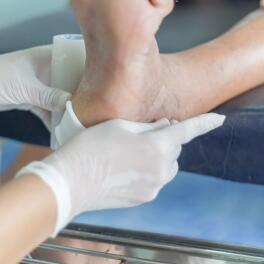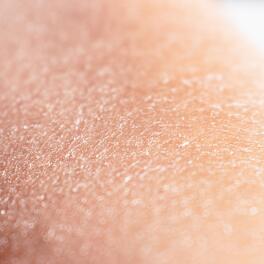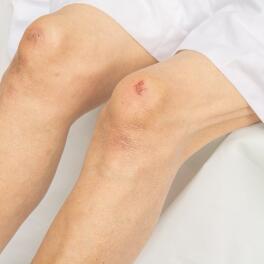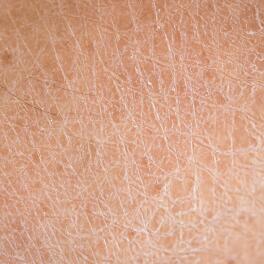Skin and menopause: how do I take care of my skin?
Menopause is the point in a woman's life when ovulation stops and menstruation ceases¹. The associated hormonal changes are accompanied by numerous symptoms that vary in severity from one woman to another: hot flushes, mood and sleep disorders, weight gain, urinary disorders, pain, hair loss, increased hair growth, etc. This period is also frequently accompanied by vulvar and skin dryness². But what exactly is the menopause? How does it affect women's skin? What can be done to prevent and limit its impact on the skin?
- 45 to 55 years
is the average age of onset of menopause¹
- 6
of skin thickness lost in a post-menopausal woman every 10 years due to a decrease in hyaluronic acid and sebum production²
- 30
loss of skin collagen 5 years after the onset of menopause³
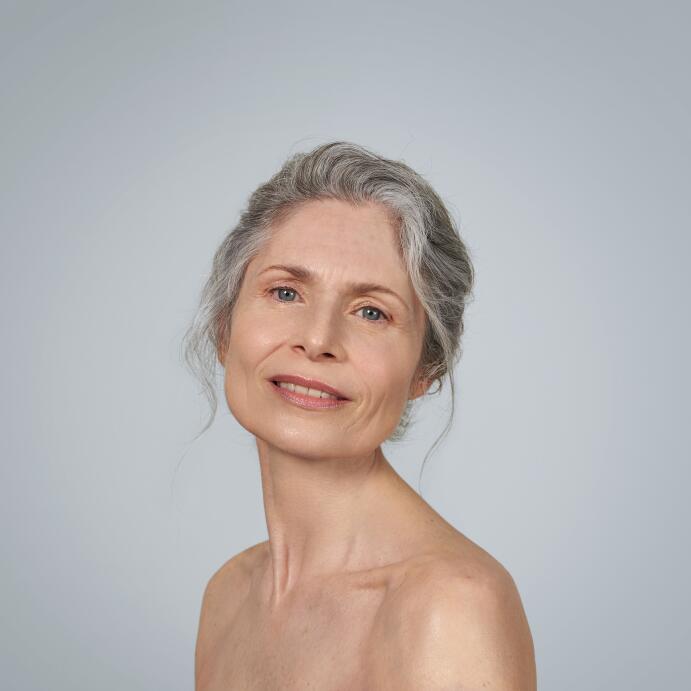
Summary
What is menopause?
Menopause is when a woman stops menstruating1,2. This cessation of menstruation is then definitive. Menopause occurs on average between the ages of 45 and 55 and more commonly around the age of 50.
It is a natural phenomenon that occurs when the ovaries stop producing sex hormones (oestrogen and progesterone). These hormones act cyclically throughout the body. This stoppage, therefore, has varying repercussions from one woman to another:
- hot flushes (in about 7 out of 10 women),
- mood and sleep disorders, fatigue
- night sweats
- urinary problems (frequent urges, infections, leaks, etc.)
- weakening of bones and joints
- hair loss and, on the contrary, hair growth,
- joint pain.
The skin is not spared either. In fact, the menopause leads to a decrease in the suppleness of the skin associated with dryness, which causes or accentuates the appearance of wrinkles.
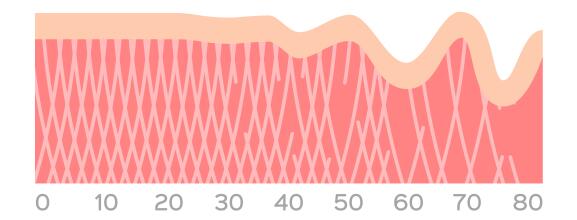
How does the skin change during menopause?
These phenomena correlate to the decrease in oestrogen production. These hormones allow for the production of the following in the dermis, the layer that is the skin's water reserve3,4 :
- collagen, a structural protein of the skin that provides resistance to stretching
- elastin, another skin structural protein that gives it its elastic properties
- hyaluronic acid, a molecule that traps large amounts of water in the dermis to ensure proper hydration of the skin
It is the decrease in collagen, elastin and hyaluronic acid content in the skin that explains these changes with the menopause. For example, there is a 30% loss of skin collagen five years after the onset of the menopause4.
What are some tips for keeping your skin smooth and well-hydrated after menopause?
During menopause, to counteract the effects of falling hormone levels on skin ageing, it may be worthwhile to adapt your lifestyle.
In fact, the impact of lifestyle is almost as strong as the physiological impact on skin ageing5. It is, therefore, useful to put into practice certain rules each day:
Quit smoking and avoid passive smoking as well
Smoking accelerates the ageing of the skin, especially on the hands and face, because the smoke settles on the pores of the skin, clogging them and reducing oxygenation. In addition, smoking causes vasoconstriction, i.e. a reduction in the internal diameter of the blood vessels. This phenomenon is accentuated in the skin, leading to a decrease in blood irrigation and, therefore, a decrease in the supply of oxygen and nutrients, and causing premature skin ageing5.

Limit exposure to the sun
The sun is the skin's number one enemy! It is best avoided between 12 and 4 pm when it is at its highest. When exposed to the sun, apply sun protection suitable for your skin type. Reapply at least every two hours. Over time, exposure to the sun's UVA and UVB rays can make the skin less elastic. The skin may even thicken, wrinkle or thin6.7. Applying an emollient before and after sun exposure is also recommended to limit skin dryness.

- Reduce coffee and alcohol consumption. The former can trigger skin inflammation while the latter dehydrates the skin, both of which exacerbate the visible effects of ageing on the skin8.
- Replace sugary drinks with water. Water helps to eliminate toxins through the urine and hydrates the skin8.
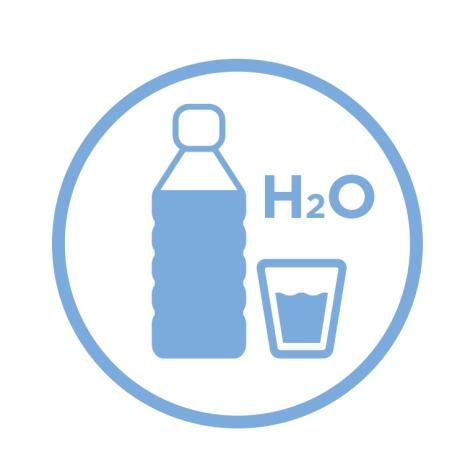
Eat a balanced diet
Several vitamins, minerals and trace elements, if provided in sufficient quantities, are known to contribute to the maintenance of normal skin. This is particularly the case for vitamins A, B3 or PP (niacin), B8 or H (biotin), B12 (riboflavin), C (ascorbic acid) and copper, iodine and zinc9. Some of these molecules are not compatible with certain conditions or health problems, so it is essential to check with a health professional before supplementing your diet.

Regulate your sleep
Sleep is essential for the rest of the brain and other organs. It allows cell renewal to take place. It is, therefore, important to get enough sleep and in good conditions

In addition to these lifestyle tips, adopting a skincare routine is also highly recommended to minimise the effects of ageing and the menopause on the skin.
- Moisturise your skin daily. Skin dehydration is an important contributing factor to wrinkles. The more dehydrated the skin is, the deeper and more visible the wrinkles will be. A moisturiser containing hyaluronic acid or glycerol
can be particularly useful9. - Do not limit skin moisturising to the face, but also take care of the whole body and, in particular, the areas where the skin becomes the driest and thinnest (shins, knees, elbows, etc.).
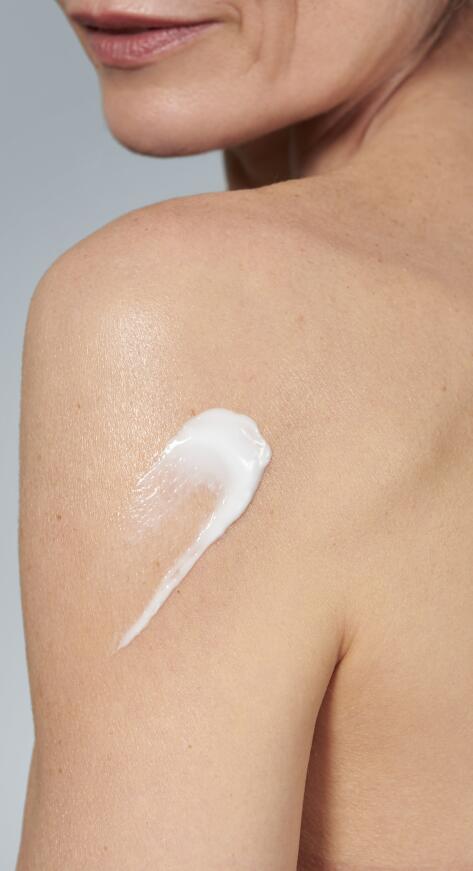
DEXERYL Emollient Cream: the skin partner for dry and sensitive skin
The first thing to do to prevent the effects of ageing on the skin is proper daily skin nutrition and hydration and gentle hygiene.
DEXERYL supports you with emollient skin care and cleansers specially formulated for sensitive and dry skin.

DEXERYL Emollient Cream
It can be used to protect the skin and reduce the signs and symptoms of dry skin.
It contains three active ingredients
- Glycerol for its hydrating action
- Vaseline and paraffin for their protective role

Dexeryl supports you each day
Sources:
- https://www.ameli.fr/assure/sante/themes/menopause/symptomes-diagnostic
- https://www.nhs.uk/conditions/menopause/
- https://www.revuegenesis.fr/peau-et-menopause/
- https://menopausetreatment.co.uk/the-affects-of-menopause-on-your-skin/
- https://dermatos.fr/le-dermato-par-specificite/vieillissement-de-la-peau/
- https://www.skinhealthinstitute.org.au/page/87/smoking-and-skin-health
- https://www.syndicatdermatos.org/peau-et-tabac/
- B PoljšakR Dahmane : Free Radicals and Extrinsic Skin Aging; Dermatology Research and Practice Volume 2012, Article ID 135206
- https://newsinhealth.nih.gov/2014/07/sun-skin
- https://www.cancer.org/latest-news/stay-sun-safe-this-summer.html




